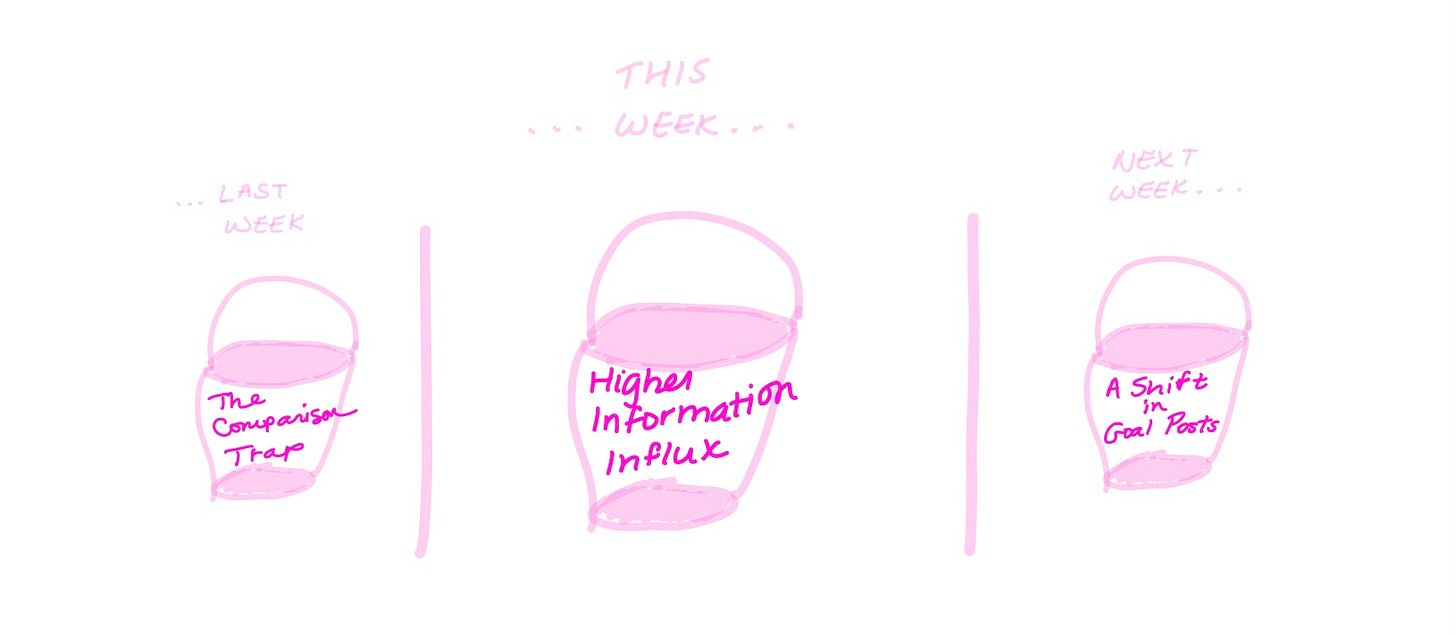Higher Information Influx
Editor’s Note: After reading Mating in Captivity by relationship therapist Esther Perel, I’ve been exploring the question “can we want what we have?” I’m applying Perel’s learnings from relationship counseling to thinking about careers. The connecting principle between relationships and careers is our natural desire for periods of stability balanced with periods of growth.
//
When we are in those periods of growth, it’s important to let our passions lead the way, i.e. those things that peak our curiosity and make us feel alive in their exploration. Last week I started to examine the predators of passion - the societal influences that might distract us from what we actually want to what we think we want. These distractors can be categorized into three buckets:
At times it's hard to distinguish our own values from external influences because the latter have become so ingrained. Today, we’ll explore how a Higher Information Influx brought to us by social media and technology enables our natural tendency to compare and offers a breeding ground to compete, oftentimes ignoring our passions in the process.
//
Picture this: It’s 6am. The alarm on your phone interrupts a beautiful dream. You hit snooze, but rather than falling back asleep for a few sweet minutes, you spend the weird in-between of slumber and spry…scrolling.
Was it Twitter? Instagram? Your drug of choice does not matter because this all-too-familiar scenario is relatable regardless.
Documentaries like The Social Dilemma explain how this is happening - meaning how the engineering behind app-addiction works. Even still, we are left asking why it is happening. What part of our human existence have these algorithms tapped into? At the core, the answer is the human desire for connection.
We compare and compete, and connect.
“Information abundance is the paradox of our time.” - Tiago Forte, Building a Second Brain
Society is more in-the-know than ever before. While the positive takeaway here is that we are all more informed about the world, we are also more informed about opportunity in the form of competition. This is dangerous as a Higher Information Influx strengthens the hold of The Comparison Trap we discussed last week. Together, these two predators of passion highlight all that we are not doing in our careers and all that we are not being when it comes to our relationships.
The Facade of Connection
As humans, we have a profound need for contact and connection from a young age. If we consider psychologist Harry Harlow’s well-known experiment for human touch, we can understand the deep-rooted origins of this animal instinct.
“Harlow took infant monkeys from their biological mothers and gave them two inanimate surrogate mothers: one was a simple construction of wire and wood, and the second was covered in foam rubber and soft terry cloth. The infants were assigned to one of two conditions. In the first, the wire mother had a milk bottle and the cloth mother did not; in the second, the cloth mother had the food while the wire mother had none.
In both conditions, Harlow found that the infant monkeys spent significantly more time with the terry cloth mother than they did with the wire mother. When only the wire mother had food, the babies came to the wire mother to feed and immediately returned to cling to the cloth surrogate…Without a surrogate mother, the infants were paralyzed with fear...[The study] produced groundbreaking empirical evidence for the primacy of the parent-child attachment relationship and the importance of touch in infant development.”
Technology definitely plays into this primal need, but presents a facade of human contact rather than meaningful connection. While the frequency of our interactions have increased — your phone is probably buzzing as you read this, notifying you that Heather just double-tapped you Insta post — the quality of these interactions is what lies in question. Esther Perel, psychotherapist, explains how technology impacts relationships:
“Technology expands the possibilities; it helps people meet who they never would have met before. But it also flattens the human experience to one dimension. In real life, relationships are iterative, back and forth, and complex like a dance. Dating apps, text messaging and all the digital tools we have today are great for "staying in touch", but they don't actually allow us to "be in touch". They sometimes generate a lot of AI: artificial intimacy. In relying on them too much, we risk losing much of what it means to be human and to understand others as humans.” Esther Perel, Hamptons
Admittedly, there are benefits to the digital age. We have democratized relationships, expanded the eligible pool of possible partners, and increased the freedom of choice.
But at what cost?
We have trained ourselves to rely on a device for a feeling of connection that can only be generated through physical human interactions. It is then obvious why connecting through technology is not enough. It leaves us with a feeling that something is missing.
Perel notes that “while we relish the freedom that comes with having so many romantic options, we dread the uncertainty that also accompanies it. The swiping culture lures us with infinite possibilities, but it also exerts a subtle tyranny. The constant awareness of ready alternatives invites unfavorable comparisons, weakens commitment and prevents us from enjoying the present moment. ‘How do I know that I’ve chosen the right one?’ we wonder. ‘What if there is someone better suited for me out there?’ Many young people today live in a state of chronic self-doubt and FOMO (fear of missing out).”
FOMO is simply a symptom of The Comparison Trap. Similar to how dating apps enable us to compare one prospective romantic option to the next, social media proliferates our comparison of our existing relationship against someone else’s.
In today’s High Information Influx era, we have a play-by-play of John and Jane’s date night — whether we want it or not. I tap through Jane’s Insta-Story with her boyfriend, getting angrier and angrier at my boyfriend because I’m in sweatpants on the couch while Jane is looking all cute with her boo at the new Nobu restaurant downtown. I call my boyfriend that night, demanding an answer to “why aren’t we fun anymore?!”
How very strange (and totally hypothetically, by the way).
To be clear, my point is not that The Comparison Trap did not exist prior to the advent of social media, but rather that Higher Information Influx has a unique ability. It makes us acutely aware of others’ lives and exacerbates the human tendency to compare, and resultantly compete, in areas of life that we may not even care about. Technology makes it easier to fall prey to the predators of passion.
We are Hyper Aware
In the same way that Tinder creates competition in relationships, LinkedIn makes us hyper aware of our colleagues’ next jobs and Instagram makes us hyper aware of how great that job might be. What’s interesting is that Instagram and YouTube originally had users competing on beauty, aesthetic, and lifestyle. Now these platforms are also the source of career competition. People have increasingly commoditized their life, gaining financial incentives by making their world look more covetable.
This new form of media and commodifying creativity perpetuates our need to self-actualize through our career. We think to ourselves, ‘if Charli D’Amelio is making millions at the age of 16 by being “savage”, surely I can do something else — anything else — than clacking away to update a balance sheet’.
The crazy thing is that you literally could.
Technology has made celebrity a real and accessible outcome for nearly all of us. On a single 3” x 5” device, we can now film/write/record, edit, and distribute our creative pursuits. This small device we all carry with us in our pockets has nearly replaced former gatekeepers like record labels and film studios. Technology has removed the barriers to entry for creators. Don’t get me wrong, this is great. However, it would be remiss to ignore the fact that not only are we looking to create, but also thinking we should create and be able to monetize that creativity.
//
This type of pressure can force us to veer away from our passions and leave us questioning if we can “want what we have”. Asking ourselves this question is valid. However, vigilance around the impacts of the High Information Influx era we live in is vital to ensuring we are not becoming misguided. That our actions are not subconsciously puppeteered, while we consciously call them by the name of passion.
Higher Information Influx has blurred the line between passion and career, and this is something we’ll explore further next week when we take a look at the final predator of passion: A Shift in Goal Posts.
Shiv


